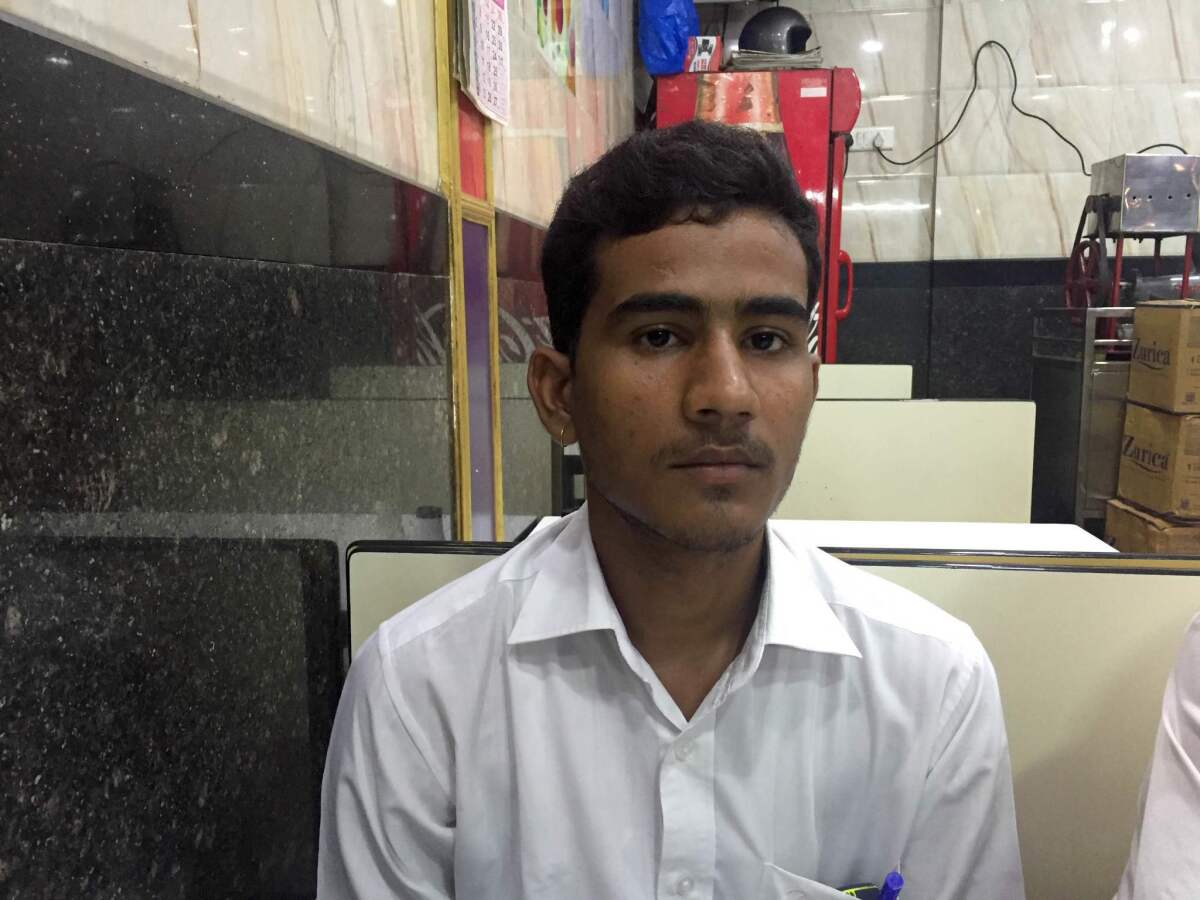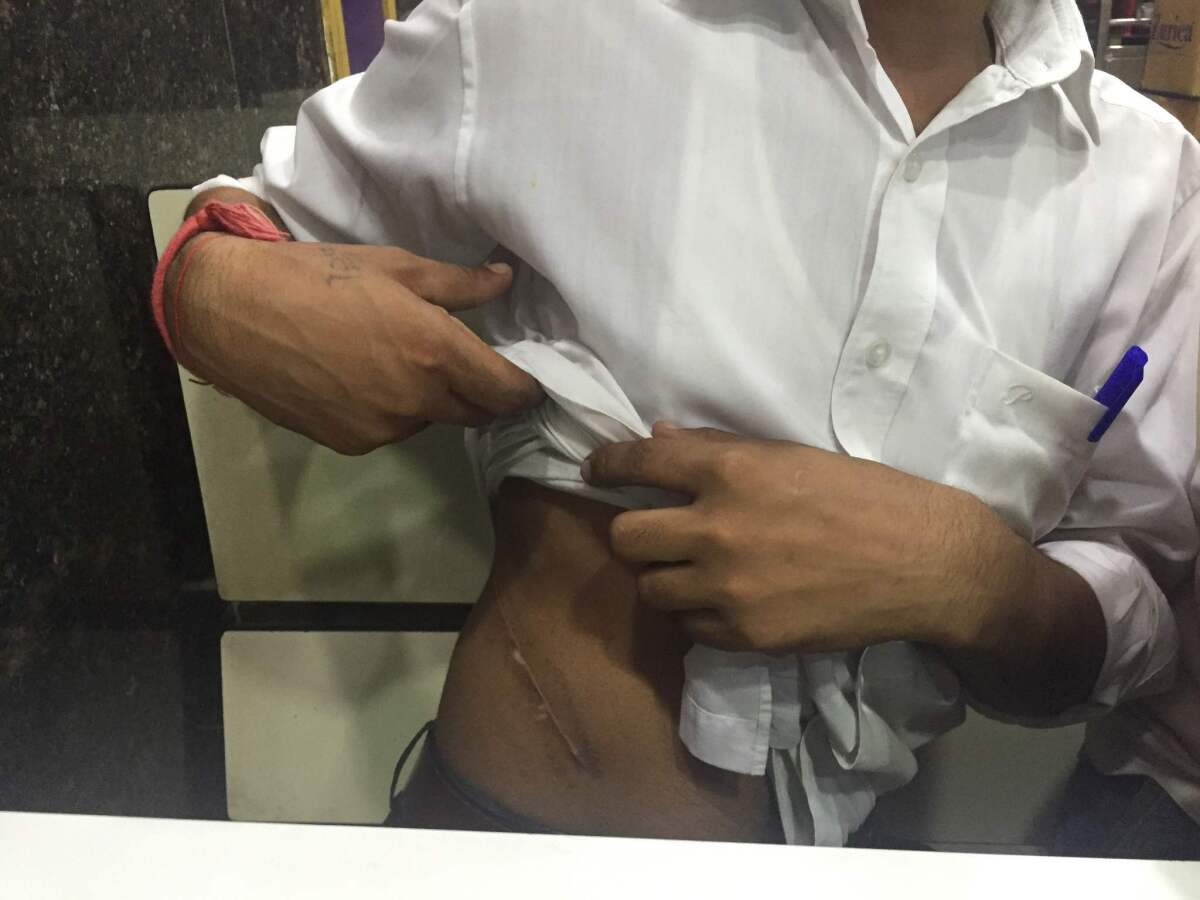Duped into selling his kidney, this 23-year-old exposed an illegal organ racket in India

Reporting from Mumbai, India — Seven years after leaving his village in northern India to find work in the bursting metropolis of Mumbai, Sundar Singh Jatav was struggling in a menial job at a video game shop. The $2.50 daily wage was hardly enough with his family back home deep in debt.
So in late 2015, when his boss introduced him to a man who promised to solve his financial problems, Jatav listened — and was shocked.
“He suggested I sell my kidney,” said Jatav, now 23.
What happened over the next several months would upend his life — and reveal a high-level kidney trafficking network inside one of the most reputed hospitals in India’s financial capital.
At least 14 people, including four doctors and the hospital’s chief executive, have been arrested since July when police, acting on information provided by Jatav, stopped a kidney transplant involving a 48-year-old patient who had presented forged documents purporting that the organ donor was his wife.
The ring is part of what one news outlet dubbed the “Great Indian Kidney Racket.”
Because the country harvests relatively few organs from people who die in accidents — the most common source of kidneys in the U.S. — the vast majority of transplants here involve living donors who give up one of their two kidneys.
To reduce the chances that money is changing hands, which is illegal in India and almost everywhere else, the law allows, with rare exceptions, only a spouse, child, parent, sibling, grandparent or grandchild to act as a donor.

For patients who don’t have a relative with a suitable kidney or don’t want to put a loved one through the small risk that donation entails, there is another option: a shadowy marketplace in which well-off patients can buy organs from strangers. The sellers are often impoverished, recruited from small towns by middlemen and made to present falsified papers — sometimes in collusion with doctors.
“This is part of our VIP culture,” said Dr. Sanjay Nagral, a surgeon and publisher of the Indian Journal of Medical Ethics. “It comes from our larger understanding and our acceptance that if you have money in India, you can buy so many things, so what is so different about buying organs?”
No one knows how many of the roughly 8,000 kidney transplants performed in India last year were illegal, but organ scams periodically surface. A month before the Mumbai arrests, a leading hospital in New Delhi was found to have performed at least three kidney transplants based on sham documents.
The case that Jatav exposed involved L.H. Hiranandani Hospital, a private facility in Powai, a prosperous suburb of wide boulevards and expansive apartments. Authorities are investigating at least four transplants at the hospital and have ordered it to temporarily stop carrying out the surgeries.
“Obviously, this case is just an indicator of what’s going on beneath the surface,” Nagral said. “We don’t know the extent of it, but it’s very difficult for these kidney sales to be completely stopped.”
The trade exists in part because of the large pool of Indians desperate enough to give up a vital organ. Just as surrogacy grew into a booming industry over the last decade, with thousands of childless Indian and foreign couples hiring Indian women to carry their babies, laborers surviving on a few dollars a day are ripe targets for agents who offer thousands for a kidney.
They basically use the poor man as a sacrificial lamb to prolong the life of the rich.
— Suresh Gupta, activist with the Indian National Congress party
Jatav, the youngest of four siblings from Uttar Pradesh, is a prime example.
Slender and shy, with barely a fourth-grade education, Jatav had been forced to become the breadwinner: His parents were weakened from old age, his sister had died from an illness, and his two brothers were unable to work because of mental disabilities.
The family was more than $10,000 in debt, and Jatav was the only hope.
In an interview in a cramped Mumbai cafe, he described his role. At first, he declined to sell a kidney. But then the agent, Iqbal Siddiqui, put him in touch with a friendly, sweet-talking man who called himself Sandeep.
Sandeep arranged for him to visit Hiranandani, a sprawling medical complex overlooking a lake. There, the small-town young man sat in a room with three doctors who told him that donating a kidney was no different than giving blood, he recalled.
“I trusted them,” Jatav said. “I thought they were good people wanting to help me with my financial condition.”
Sandeep did not offer Jatav a specific price for his kidney, saying only that it would be enough to pay off his family’s debt and promising to help him get a better job. To sweeten the deal, Sandeep moved Jatav, who had been sleeping on a mattress in a corner of the video game store, into a small apartment rent-free.
Jatav never saw the donor forms that were submitted on his behalf, which claimed he and the recipient — later revealed to be a 30-year-old woman from New Delhi — were siblings from suburban Mumbai. He was admitted to the hospital March 15 after undergoing blood tests.
Two days later, his kidney was removed. Within a week, he was discharged.
But he had not been paid, and Sandeep was dodging his calls. When they finally spoke, Sandeep was evasive about the money but offered to bring Jatav on as a sort of assistant, tasking him with carrying bags and files.
Jatav can barely read English. But he observed Sandeep meeting with other donors and realized that their documents also were being forged to show a blood relationship with a kidney patient.
Through a friend, Jatav contacted Suresh Gupta, an activist with the Indian National Congress political party, and slipped him two pages of a transplant application. On July 12, two days before Brijkishore Jaiswal, a 48-year-old sari merchant, was to undergo surgery, Jatav called Gupta, who tipped off police.
Jaiswal and the seller, a 42-year-old housekeeper, were arrested just before the operation was to start.
The three doctors who allegedly persuaded Jatav to give up a kidney were arrested and freed on bail. A preliminary inquiry conducted by state health officials and leaked to Indian news media suggests they were complicit in the scam, although a lawyer for the doctors called the allegations “nonsense.”
Police also arrested the hospital’s transplant coordinator, who allegedly arranged phony documents, as well as Siddiqui and Sandeep, whose real name is Bhijendra Bisen.
Bisen, 42, is one of Mumbai’s most notorious organ traffickers. He was jailed a decade ago for a similar scam and has confessed to involvement in more than 30 kidney transplants over the last four years, the Hindustan Times newspaper reported.
Jaiswal had paid him more than $30,000 for the transplant, his lawyer, Shabnam Khadri, said in an interview. The hospital said it received $7,000. The seller was promised about $3,000. When police raided the transplant coordinator’s home, they reportedly found $12,000 in cash. It was unclear how the rest was to be distributed.
Gupta, the activist, said agents like Bisen exploit ignorance and vulnerability.
“They basically use the poor man as a sacrificial lamb to prolong the life of the rich,” he said.
India was once a top destination for transplant tourists — patients from the United States and other wealthy countries who traveled here to receive kidneys because of shortages in their countries. Facing criticism that the system exploited the poor and that the procedures were secretive and often unsafe, India passed a law in 1994 that banned organ sales and allowed only close relatives to serve as donors.
Researchers believe that 220,000 Indians need kidneys, but the nonprofit Indian Transplant Registry estimates that only 8,000 people got one last year.
One reason is that most transplants are performed in private hospitals at a cost of $10,000 or more, and few people have health insurance or the money to pay for it.
Those who can afford a transplant face another obstacle: The lack of a national system to collect organs from cadavers — such as the more than 100,000 Indians who die each year in car accidents — means that kidneys are in short supply.
Only about 15% of India’s transplanted kidneys come from deceased donors, although that figure has been rising steadily. Some eligible living donors are simply afraid to part with an organ, even for a relative, doctors say.
That has helped give rise to the black market for living donors posing as relatives.
“It’s a supply-and-demand problem,” said Sunil Shroff, a urologist who runs the transplant registry. “Families are sometimes pushed against the wall when they’re not able to find a solution. In desperation, they can do all kinds of stupid things.”
It is unclear why Jatav was never paid. Had he been, it is likely the kidney ring would have remained hidden.
After going public, he said, he received threatening phone calls that prompted him to take his wife back to his village for her safety. Although he agreed to have his story told in an American newspaper, he has not revealed his role in the case to her or other family members.
He remains in Mumbai, where he has asked for police protection and is looking for a job, having quit the video store before the operation. A friend is paying his rent.
He lifted up his white button-down shirt to reveal a foot-long scar across the right side of his torso. His appetite has diminished, he has bouts of dizziness, and he cannot walk for more than a few minutes without fatigue — symptoms he blames on the kidney procedure, even though such complications are rare. He does not have money to see a doctor.
“I was the only son who my parents thought could make some money for them,” he said. “With my health, what options do I have now?”
But he is not the only one in this story to suffer.
Before his transplant was foiled, Jaiswal had been surviving on twice-weekly dialysis treatments and was usually nauseated and weak. He turned to the black market for a kidney, his lawyer said, because no one in his family was willing to donate.
After his arrest, he was granted bail because of his declining health and returned home to the neighboring state of Gujarat. He continued to get sicker and on Aug. 31, six weeks after Jatav blew the whistle, died of kidney failure.
Family members took his body to be cremated along the Ganges River in Varanasi, the holiest city in Hinduism, where all one’s sins are believed to be absolved upon death.
Parth M.N. is a special correspondent.
Follow @SBengali on Twitter for more news from South Asia
ALSO
Why millions of Indian workers just staged one of the biggest labor strikes in history
German intelligence chief warns about growing number of Salafi Muslims in his country
Nearly half a million U.S. citizens are enrolled in Mexican schools. Many of them are struggling
More to Read
Sign up for Essential California
The most important California stories and recommendations in your inbox every morning.
You may occasionally receive promotional content from the Los Angeles Times.











